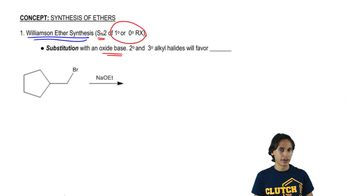Here are the essential concepts you must grasp in order to answer the question correctly.
Ethers and Their Synthesis
Ethers are organic compounds characterized by an oxygen atom connected to two alkyl or aryl groups. Their synthesis often involves the reaction of alcohols or alkoxides with alkyl halides through nucleophilic substitution. Understanding the mechanisms of ether formation is crucial for designing effective synthetic routes.
Recommended video:
The Mechanism of Williamson Ether Synthesis.
Nucleophilic Substitution Reactions
Nucleophilic substitution reactions, particularly SN2 mechanisms, are fundamental in organic chemistry for forming new bonds. In these reactions, a nucleophile attacks an electrophile, displacing a leaving group. The choice of starting materials and conditions can significantly influence the yield and selectivity of the desired ether product.
Recommended video:
Nucleophiles and Electrophiles can react in Substitution Reactions.
Alkenes and Their Functionalization
Alkenes are hydrocarbons containing at least one carbon-carbon double bond, making them reactive intermediates in organic synthesis. They can be functionalized through various reactions, such as hydroboration-oxidation or alkoxymercuration, to introduce ether groups. Understanding how to manipulate alkenes is essential for synthesizing ethers like 2-ethoxyoctane from octene.
Recommended video:
Identifying Functional Groups
 Verified step by step guidance
Verified step by step guidance Verified Solution
Verified Solution



 4:21m
4:21m